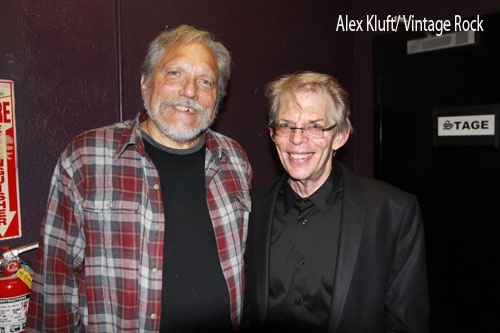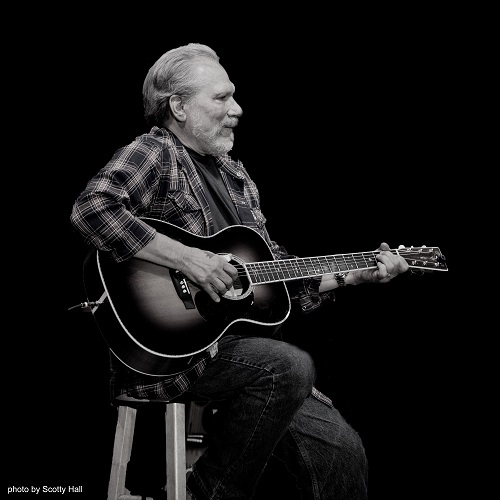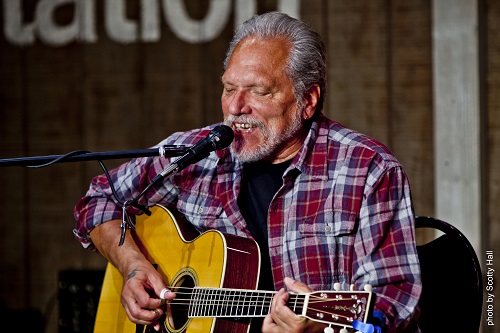By Greg Prato
Entering his seventh decade as a recording artist, Jorma Kaukonen needs no introduction to classic rock fans. But, just in case you need a refresher, he has been a major contributor to both Jefferson Airplane and Hot Tuna, in addition to issuing solo albums, and along the way, touching upon a variety of styles — rock, psychedelic, blues, folk, etc.
This year saw the release of a vinyl edition of his 1998 solo effort, Too Many Years, with further Hot Tuna performances. And shortly before 2022 came to a close, Kaukonen spoke with VintageRock.com about his past, present, and future (and additional thanks to Jorma for pointing out the quality of several of the questions!).
~
Your 1998 album, Too Many Years, will soon be reissued on vinyl. What does that album mean to you?
The song, “Too Many Years,” was an important song when I wrote it — many years ago. It’s a song about relationships and conflict, and it had a lot to do with my ex-wife. It’s one of those songs that’s sort of like a zeitgeist for me in some ways. So, the fact that we were able to do such a beautiful package with the album, it was really cool. Because things go out of print these days and boom, they’re gone and you never hear about it again. To get a chance to get a re-release of an album that I liked — but wasn’t a huge success — was cool.
It seems like vinyl’s popularity has surged in recent years. What do you attribute that to, and are you a vinyl listener or collector yourself?
Good question. Back in the day, vinyl was everything — to guys in my generation, and ensuing generations. And we went through all the other stuff — “Wow, I got a cassette player!” And all these other formats. It was just something to me that makes the music important when it’s on vinyl. Listen, I download stuff just like everybody else. But there’s something when I pick up a record – because I have a nice, old Marantz hi-fi system. So, when I pick up a piece of vinyl, it’s like making “a listening appointment.” It means I’m going to sit down and listen to the record. And when I listen to a record – also probably because of the generation I come from — I don’t say, “I’m going to listen to track one or track three,” which I would probably do if I was listening to something online. But when I listen to a piece of vinyl, I listen to side one…and I listen to side two. So, it is important. And I think there is a certain quality to vinyl’s sound. I’m not a real technical kind of guy, so I don’t know what to attribute this to, but there just seems like there is more of a weight to vinyl listening for me.
What can fans expect from the upcoming run of Hot Tuna dates?
So, good ol’ Hot Tuna has got a bunch of interesting stuff coming up. It’s really great to have a bunch of great friends you can play with every now and then. And our Capitol Theatre dates, the great horn player Steve Bernstein is going to be sitting in with us. And other than that, on the rest of the dates, it will just be Jack, myself, and Justin Guip playing drums. If there’s anything good that came out of the pandemic, I got a chance to sit back and look back at my catalog of stuff, and really start resurrecting some songs that I never would have taken the time to do in a million years — because when you’re on the road, you never have any time. So, we sourced a lot of material from older albums that we hadn’t played in a number of years. We’ll be playing a lot of older stuff we normally don’t play — on this tour.

How do you compare playing with Jack Casady now compared to earlier in your careers?
Again, a super question. I was just talking to Jack about this. The Jefferson Airplane, we just got a star on the Hollywood Walk of Fame, and I went out there, and Grace and Jack. But as a result, I normally don’t listen to myself. But I look back and listen to some early Airplane — notably on Takes Off, the first Airplane album, which is a genuine folk rock album — Jack has always been Jack. Listen, we’ve all learned a lot of stuff over the years, and I think that in some respects, Jack’s concept of harmony is more sophisticated than it was – but it was always sophisticated. I told him, “You were exactly who you are when we first started playing together with the band.” I was just listening to this Go Ride The Music thing (a DVD that features vintage performances by Jefferson Airplane and Quicksilver Messenger Service, among others), where they have some Airplane stuff from the Family Dog things, and it’s a hot show. And I’m playing good electric guitar with the band at that time. But I consider myself to be a much better guitar player today than I was then. But Jack was ALWAYS Jack. He keeps advancing, but he was great in the beginning, so, to have him to lean on all these years has just been fantastic.
Do you stay in touch with Grace Slick, and if so, have you ever thought about making music together again?
Another great question, my friend. That answer is yes, we do stay in touch. Grace is a funny lady — like, I’m talking to you on my iPhone, and we were just complaining about Zoom not working. Grace doesn’t do any of that stuff. To my knowledge, she doesn’t have a cell phone. She doesn’t do email — if you want to get in touch with her, you have to call her house, and you’re probably going to have to leave a message, and she’s probably going to have to call you back. However, there’s only three of us left now (from the classic Jefferson Airplane lineup) — Jack, Grace, and myself. So, I find it necessary to call periodically and just see how she’s doing. You tend to take people for granted sometimes, and a couple of months ago I got her on the phone, and I told her, “Y’know Grace, I’ve never told you this, but it was an honor to play music with you back then.” And on the subject of playing music now, she has some sort of odd ideas of playing music at various stages, and maybe it’s different for her because she’s a woman — I don’t know. I mean, I couldn’t imagine not playing music. However, again, in the recent past, she said, “I’ve been playing some piano again at home.” And I said, “Listen, if you ever decide you’re going to record stuff, I would come to your house and do this because I know you don’t leave your house much. And if you don’t call me and Jack…we’re going to be pissed!”
A few years back, your autobiography, Been So Long: My Life and Music, was released,. What made you decide to write it?
I’ve been journaling and doing stuff like that really all my life. But that’s a lot different than writing a book. So, about 20 years ago, I was approached by a publishing company that shall remain nameless, and they wanted to do a Jorma book, and they wanted to have a co-writer write with me. And I met with the guy, and I realized that they were really interested in me telling stories about people who were more famous than myself. And I wasn’t interested in that. So, I just said, “No thanks,” and I let it go. But then, St. Martin’s Press got a hold of me, and we started talking about it. And it seemed to me I had the time to do this…and I’m going to give it a shot, to see how it works. Now, I will tell you also, it took me two years to write that book. But once I said, “Let me think about this,” what really got me off my ass was we got an advance from the book company, and once you get that, you HAVE TO write the book! [Laughs] So, that’s what happened. And once I got into it and spent a bunch of time working on it, and I was no longer self-conscious about talking about myself, I really had a great time writing it.
One of my favorite Hot Tuna tunes is “Water Song.” What do you recall about the writing and recording of it?
I don’t play in alternative tunings, but I write in them sometimes. “Water Song” is in a G-tuning. It’s really funny, because all my buddies that play traditional-esque blues stuff, if they play in G-tuning, it’s a bluesy sounding thing. To me, it’s a pretty thing. So, I remember I had my guitar in a G-tuning, and I just started messing around with it. It’s kind of like a banjo role — the beginning of how the song goes. It starts out that the two positions are the first finger on the first fret/second string, and the fourth fret, second fret, and then a whole step up — and just messing around with it. It was just so darn pretty that I kept at it, and one thing led to another. It’s not a very complicated song, but I had a song. And of course, Jack — it’s really a vehicle for Jack to be Jack. So, he’s playing these great parts. And Sammy Piazza — a really inventive drummer. Not only did he play drums on it, but he also played timpani. We recorded that song at Wally Heider’s in San Francisco, and they had a couple of kettledrums there. So, there’s a bunch of stuff that would never have occurred to me. But Sammy goes, “Well…I’ll do some kettledrums,” and played those. So, that’s kind of how that song was recorded, and I loved the way it came out. Now, over the years, the way I play it pretty much is the way I wrote the song, because that’s how it goes. The other night, we’re playing with Larry Campbell, and he goes, “I’ve worked out a harmony guitar part for ‘Water Song.’ Let’s do it together.” And I said, “Absolutely.” So, we did this version the other night that just knocked my socks off. I mean, he didn’t change anything — it’s still Jorma and Jack: “Water Song” — but there are these beautiful harmony guitar lines that we had such a good time with.
What do you recall about your 80th birthday show with Hot Tuna at Carnegie Hall earlier this year?
Actually, it was my 81st and a half because of the COVID thing. But back in the 70s, Hot Tuna played Carnegie Hall. And back then, our fans were much younger and they were not as well behaved as they are today. So, we did our show in Carnegie Hall…and we were banned from Carnegie Hall! We thought we’d never get another gig there. So, to be able to go back to Carnegie Hall and enjoy the amazing tradition — it just oozes from the walls. The pictures of the people that have played there and all that kind of stuff, it was the kind of thing that I wish my parents were alive to have seen.
Rolling Stone has called Hot Tuna “A psychedelic-blues institution.” Do you agree?
I probably wouldn’t use that word because I’m not really sure what it means this way. As a guy that realizes if you have your name in print and it’s moderately complimentary, that’s probably a good thing. But I probably wouldn’t say that because I don’t see Hot Tuna as a psychedelic band. But I don’t think it’s really up to me to categorize myself. If that’s the kind of image that people think about it — and I know them — I’ll go, “I don’t really think so.” Most of our stuff is not really psychedelic in the way that some of it was with the Airplane. But…if it makes you happy to say that, I’m OK.
Future plans/projects?
One of the things that I think is going to happen soon is that in 1960, I was 19 or 20 years old, I had just learned how to play fingerstyle guitar — had been playing for around four months. I quit going to college classes to do it. And I was working in New York at an Antioch College co-op job for four months, and then I was going to join my folks back in the Philippines — my dad was in the Foreign Service. And I stopped by DC, and Jack recorded 19 songs that I knew at that time. And he put the tapes away and we forgot about them. So, he found them around five or six months ago, remastered them, and Culture Factory is going to release all those songs in a nifty package at some time over the course of the next year. And, Jack and I have been doing a little bit of writing together. I am not a prolific writer and I kind of need deadlines to kick me in the butt. And we don’t really have a record deal now, so I don’t have a deadline hovering over me. But we do have the deadline in the fact that we’re not kids anymore. So, we’re starting to put stuff together. I couldn’t tell you when we’re going to be ready to record, but I have two new songs — and that’s better than none.





















